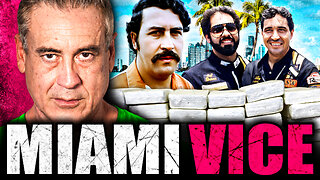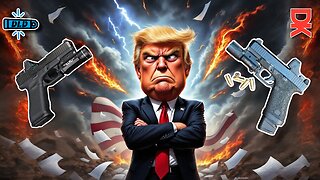Premium Only Content

Unraveling the DeFi Revolution
In the ever-evolving panorama of financial evolution, a new titan is emerging from the digital depths: Decentralized Finance, or DeFi. At its core, DeFi challenges and redefines everything we've come to understand about financial systems – the role of intermediaries, the access gateways, even the very structure of trust.
Imagine a world where a budding entrepreneur in a remote village can receive a loan without ever stepping into a bank. Visualize a scenario where financial transactions, governed by transparent algorithms, occur peer-to-peer without a mediator taking a cut. This isn't a glimpse of a distant future; it's the DeFi reality that's unfolding now.
But what exactly fuels this radical reimagining of finance? The magic word is 'blockchain' – a decentralized ledger that, by design, is resistant to data modification. DeFi leverages blockchain's transparent and secure nature, allowing for systems where trust is established not by centralized entities, but by codes and consensus.
A significant allure of DeFi lies in its promise of 'financial inclusivity.' Traditional banking systems have, for long, excluded vast populations due to infrastructural and bureaucratic limitations. DeFi, with its decentralized ethos, promises to democratize access, offering services from loans to insurance, irrespective of geography or socio-economic standing.
But it's not all rosy. With high rewards come heightened risks. The decentralized nature, while eliminating intermediaries, also means there's no central authority to oversee or intervene. Vulnerabilities in smart contracts, the potential for "rug pulls", and other DeFi pitfalls have led to substantial losses for the uninformed. As with all innovations, the road to maturity is paved with trials, errors, and invaluable lessons.
More than just the risks and rewards, the rise of DeFi poses existential questions for traditional financial institutions. As DeFi platforms proliferate, capturing more market share, where does that leave traditional banks and financial bodies? Will they adapt, fight, or fade?
Looking ahead, the DeFi movement teeters on a knife-edge. On one side is the potential for widespread adoption, leading to a more inclusive, efficient, and transparent financial ecosystem. On the other, looming shadows of regulatory challenges threaten to stymie its growth. Moreover, with innovations like Decentralized Autonomous Organizations (DAOs) on the horizon, the realm of possibilities seems boundless.
In conclusion, DeFi isn't merely a technological marvel; it's a philosophical shift in understanding money, power, and trust. As we stand at the cusp of this financial frontier, one must ponder: Is the world ready to trust in a system that relegates traditional financial wisdom to the annals of history?
-
 4:17
4:17
MYSTERIOUSREALITIESNOW
1 year agoUnraveling Universe's Mysteries: Is This Alien Discovery Out of This World?
299 -
 2:02:28
2:02:28
Badlands Media
1 day agoDevolution Power Hour Ep. 385: Trump “Death” Hoax, Supreme Court Tariffs Fight, and Tech-Military Ops
63.5K28 -
 1:56:48
1:56:48
Tundra Tactical
6 hours ago $12.40 earnedFull Semi-Auto Comedy Hour
31.7K2 -
 2:07:31
2:07:31
The Connect: With Johnny Mitchell
16 hours ago $7.70 earnedSecrets Of The Cocaine Cowboys: Miami Drug Lord Reveals Truth About His BILLION-DOLLAR Coke Empire
30.3K1 -
 1:55:52
1:55:52
BlackDiamondGunsandGear
1 day agoGlocks Want Gun Control? // Trump Tramples on your Rights? // After Hours Armory
29.9K3 -
 1:55:52
1:55:52
DLDAfterDark
11 hours ago $4.31 earnedDLD Live! Trump - Flag Burning - Glock & Gun Control - Martial Law Light?? - After Hours Armory
24.6K3 -
 13:46:18
13:46:18
GritsGG
17 hours agoRumble Customs! 3515 Ws! 🫡!
94.2K -
 5:59:47
5:59:47
SpartakusLIVE
13 hours agoThe HUGEST Brain (not forehead) delivers Saturday SPARTOONS || Variety Later - Shadow of Mordor
197K4 -
 2:34:20
2:34:20
Barry Cunningham
14 hours agoPRESIDENT TRUMP WELCOMES FOOTBALL SEASON! AND MORE BREAKING NEWS!
90.3K56 -
 54:47
54:47
Side Scrollers Podcast
17 hours agoSide Scroller Presents KING OF THE KART | MASSIVE MARIO KART TOURNAMENT
52.7K1